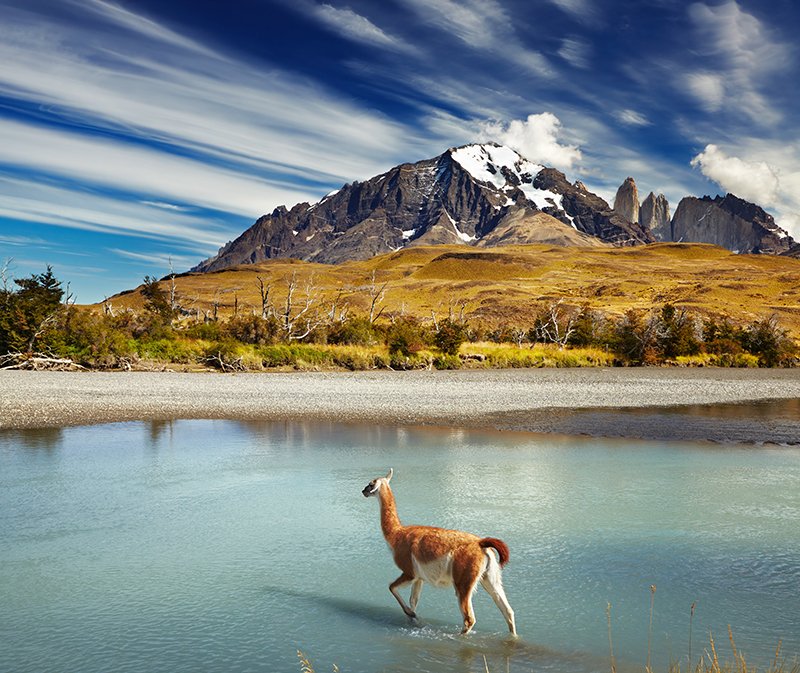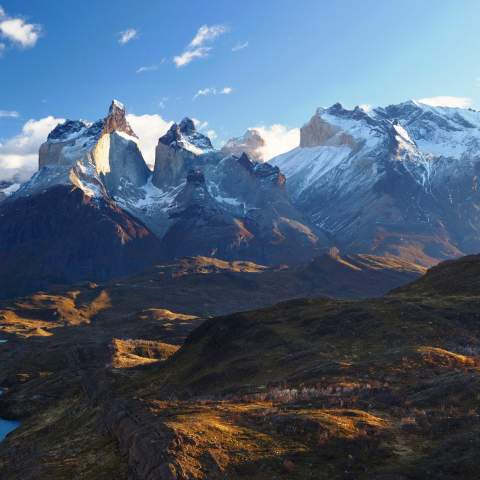06/28/2019

There’s a good chance you’ve seen the word “rewild” with much greater frequency recently. While it has been a favorite concept among conservationists for a little while now, these days the general public is becoming increasingly aware of the term and the vision of conservation that it represents.
We now face the reality that approximately 75 per cent of our planet has been significantly affected by human activity and some 60 per cent of the world's animals have been wiped out since the 1970s, leaving very few pockets of true wilderness today. As a result, the concept of rewilding as a legitimate conservation practice is now gaining serious practical momentum.
First coined in the 1990s by environmental activist Dave Foreman, rewilding is about restoring entire ecosystems to their natural state by removing foreign species and reintroducing and protecting those species native to the region. Biologists Michael Soulé and Reed Noss outlined that the method is based on "cores, corridors, and carnivores,” which is to say its success requires the regulatory roles of large predators and complete connective wilderness so as to not disrupt the natural interaction of the ecosystem. This means removing damns and other breaks in natural waterways, largescale reforesting, and the careful re-introduction of lost species. Chile, in particular, has seen some big moves being made as part of the effort in recent years, with a specific focus on connectivity across substantial spaces.
Kris McDivitt Tompkins, the former CEO of the Patagonia clothing brand, and her late husband Doug Tompkins, the founder of Esprit and North Face, bought massive tracts of land in Patagonia for the purpose of rewilding. The Tompkins acquired the land piecemeal from ranchers and other landowners over several years and Kris handed it over to Chile in April 2019 so that it can be run as a national park with CONAF, the Chilean forest service, managing the land. Chile has committed an additional $350 million investment for staffing and maintenance of the land.
The move is being recognized as the single biggest land donation in history and as a conservation effort it has been dubbed “the world’s most ambitious rewilding project.” Thus far the project has involved hundreds of volunteers working with Conservación Patagónica, the Tompkins’ conservation foundation, to start converting the overgrazed ranchlands into a pristine wilderness once more. The success of the Patagonia project could have widespread implications around the world as scientists are looking to the region for a proving ground for the process as it shifts from fringe conservation concept to mainstream theory.
Submitted by Zach on Fri, 06/28/2019 - 10:13am

There’s a good chance you’ve seen the word “rewild” with much greater frequency recently. While it has been a favorite concept among conservationists for a little while now, these days the general public is becoming increasingly aware of the term and the vision of conservation that it represents.
We now face the reality that approximately 75 per cent of our planet has been significantly affected by human activity and some 60 per cent of the world's animals have been wiped out since the 1970s, leaving very few pockets of true wilderness today. As a result, the concept of rewilding as a legitimate conservation practice is now gaining serious practical momentum.
First coined in the 1990s by environmental activist Dave Foreman, rewilding is about restoring entire ecosystems to their natural state by removing foreign species and reintroducing and protecting those species native to the region. Biologists Michael Soulé and Reed Noss outlined that the method is based on "cores, corridors, and carnivores,” which is to say its success requires the regulatory roles of large predators and complete connective wilderness so as to not disrupt the natural interaction of the ecosystem. This means removing damns and other breaks in natural waterways, largescale reforesting, and the careful re-introduction of lost species. Chile, in particular, has seen some big moves being made as part of the effort in recent years, with a specific focus on connectivity across substantial spaces.
Kris McDivitt Tompkins, the former CEO of the Patagonia clothing brand, and her late husband Doug Tompkins, the founder of Esprit and North Face, bought massive tracts of land in Patagonia for the purpose of rewilding. The Tompkins acquired the land piecemeal from ranchers and other landowners over several years and Kris handed it over to Chile in April 2019 so that it can be run as a national park with CONAF, the Chilean forest service, managing the land. Chile has committed an additional $350 million investment for staffing and maintenance of the land.
The move is being recognized as the single biggest land donation in history and as a conservation effort it has been dubbed “the world’s most ambitious rewilding project.” Thus far the project has involved hundreds of volunteers working with Conservación Patagónica, the Tompkins’ conservation foundation, to start converting the overgrazed ranchlands into a pristine wilderness once more. The success of the Patagonia project could have widespread implications around the world as scientists are looking to the region for a proving ground for the process as it shifts from fringe conservation concept to mainstream theory.
Most Popular Chile Trips & Tours
| Trip | Price | Days | Highlights |
|---|---|---|---|
| Australis Glacier Cruise & Patagonia Hiking | $6,560 | 12 Days | Mt. Fitz Roy & Cerro Torre, Cape Horn, Tierra del Fuego National Park, Los Glaciares National Park, Perito Moreno Glacier |
| Chile Triangle | $6,845 | 12 Days | Chile's most famous regions, Easter Island, a UNESCO World Heritage Site , Atacama Desert, Torres del Paine National Park |
| Classic Patagonia & Torres del Paine | $6,425 | 10 Days | Los Glaciares National Park, Torres del Paine National Park, Perito Moreno Glacier, Classic Treks to Mt. Torre and to Mt. Fitz Roy |
| Lake District and Chiloe Island | $2,995 | 7 Days | Myths and legends in Chiloe Island, Lake District, Llanquihue Lake and majestic Osorno Volcano |















